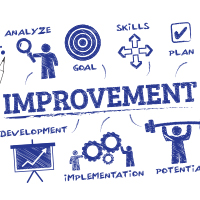
Continual improvement is a never ending journey to business excellence. It may lead to incremental organizational improvements or breakthrough ideas. We teach our current undergraduate and graduate students never to be satisfied with today’s “current state” but rather seek improvements in all processes. An organization that focuses on continual improvement will detect real or potential problems and implement changes to eliminate these issues. Defining a “future state” and implementing changes to improve for example operating efficiencies, customer service levels or sales levels should be a business priority.
Education is the stimulus for building a mindset of continual improvement. Briefly, education is administered formally or informally. Formal education may be programs such as an undergraduate or graduate curriculum in a university setting. Informal education comes in the form of mentoring, online learning or “hands on” experience. Both formal and informal education provides the same objective for the student, to learn and grow. Formal education provides the theory necessary to gain profound knowledge in any business setting. Informal education will provide the student opportunity to employ this knowledge in a practical setting.
Students are exposed to the power of continual improvement in classes such as Operations Management. As a teaching practitioner I watch in amazement at how both graduate and undergraduate students absorb the concept and realize the power continual improvement has to offer. The “tool box” to deploy continual improvement is quite large. Such improvement tool examples include process maps, check sheets, affinity and fishbone diagrams to name a few. In my opinion, formal education provides students with the tools for making decisions. Defining a “tool box” comes informally through work experiences and mentoring. In various instances formal an informal education may be joined. For example, the Benedictine capstone class in Strategic Management uses the BSG (Business Strategy Game) tool to reinforce how to run a business. The simulation provides application of theory and the need to excel in building the business using continual improvement methods. Other important examples include relevant case studies or practice labs which may be qualitative or quantitative in nature.
Whichever method is used, the continual improvement mindset is a requirement for every business. As current or future business practitioners we must build a solid foundation on the theory and practical application of continual improvement. As instructors in either the graduate or undergraduate school, we owe the topic of continual improvement some respect. As a hiring manager of professionals, I seek candidates with knowledge and understanding of continual improvement methods. The road to profound knowledge requires a thorough understanding and application of theory in a real world setting. Theory put into practice is an educational process in itself.
So I recommend you get started on this journey. The ever changing business climate demands continual improvement methods be evident at the strategic, tactical and operational levels of the organization. Using continual improvement as a competitive advantage should be a priority. Move forward with a sense of urgency and be in awe of the power this method provides.
To learn more about continual improvement and earning a Master of Business Administration (MBA) online, visit us at online.ben.edu or call us at (866) 295-3104.
About the Author
Pete Papantos is an operations director at a Fortune 500 company. He is responsible for the global execution of their strategic plan and driving operational excellence using lean methods. In addition, Pete is a graduate instructor with emphasis in operations and strategic management — both in traditional and online settings.

